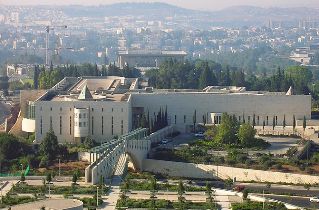
The High Court of Justice will hear a petition by the Association for Civil Rights in Israel on Monday (14 January) against the decision by the Chairman of the Central Election Committee to censor excerpts from election broadcasts by the Otzma Leyisrael and Balad parties.
In a petition filed Friday (11 January), ACRI demanded the court revoke the decision by Chairman of the Central Election Committee Justice Elyakim Rubinstein to disqualify parts of the Otzma Leyisrael and Balad parties’ election advertisements. The petition will be heard on Monday by an extended panel of five: Supreme Court President Asher Grunis, Justice Miriam Naor, Justice Salim Joubran, Justice Esther Hayut and Justice Edna Arbel.
ACRI Attorneys Sharona Eliyahu-Chai and Dan Yakir noted in the petition that freedom of expression is a fundamental right, and it is especially important in election campaigns to allow voters to get information from candidates so that they can make the most informed choice.
The disqualification of sections of Otzma Leyisrael’s broadcasts was made with regards to two phrases. In the first, the decision was made with the consent of the party but without any further explanation, to remove the phrase “not an Arab state, not an infiltrators’ state” from the radio broadcasts on the grounds that it contains a message promoting the exclusion of Arabs from the State of Israel.” In the second decision, the chairman ordered the removal of the following lines from the television broadcast: “In Sakhnin, not everyone pays property taxes”, “In East Jerusalem they disregard the law” and “In Taybeh and in the Negev they are building pirated villas” on the grounds that it harms the feelings of a certain population.
In the same decision, the justice ordered that they remove the quote “and not for Arabs” following the sentence “The land of Israel belongs to the people of Israel” from the radio broadcasts.
This is not the first time Justice Rubinstein has intervened in the content of this election’s campaigns. In an earlier decision, he ordered the removal of posters promoting Otzma Leyisrael in which the word “loyalty” appeared in Arabic above the line “no rights without obligations”.
Rubinstein also decided to disqualify a section of radio broadcasts by Balad in which the national anthem “Hatkiva” was played to the tune of a hit Arabic song. Justice Rubinstein noted in the decision that the anthem is broadcast in a way that “distorts and ridicules it” and shows “contempt for the symbols of the state, a Jewish and democratic state, and that’s not acceptable to me.”
On this issue, the petition states that “even parody and satire are an indivisible component of freedom of expression. In this case we’re not even dealing with the satirization of the anthem itself, but rather the politicians that make use of it.”
The petition also notes in reference to the disqualification of elements of Otzma Leyisrael’s broadcasts that freedom of expression applies equally to expressions with a racist character.
The petition claimed that the test for disqualifying expressions must be especially strict when it comes to election campaigns: The risk of concealing the real platforms and positions of candidates vying for the Knesset on the eve of the elections outweighs the risk that the broadcasts could incite racism.
The statements that were censored do not reach the level of “clear and present danger of causing substantial, deep and real harm to the feelings of the audience – harm beyond the level of tolerance required in a democratic society.”
ACRI Attorney Sharona Eliyahu-Chai stated: “The fact that some of the broadcasts are racist deserves to be publicly criticized, yet there is no legal basis for the intervention of the Chairman of the Central Election Committee as it does not meet the test to restrict freedom of expression prescribed in High Court rulings. On the contrary, it is not only the right of the parties to air their messages to the public; it’s also the right of the public to be exposed fully to the broadcasts and not ‘diluted’ versions of them.”
Attorney Dan Yakir, ACRI Chief Legal Counsel: “Freedom of expression includes the right to broadcast satire and provocative statements. While radio and television are no longer the exclusive channels for a political campaign’s public exposure (and it is safe to assume that the disqualifications will only increase the visibility of these messages), when a Supreme Court Justice damages freedom of expression without valid justification, it sets a dangerous precedent.”







